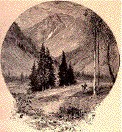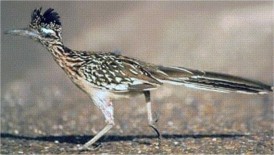
Montana Estatua

|
Montaña Estatua
By Gregory S Trachta
Table of
Contents
A Foreword From the Chorus Waxing Waning The High Reedy The Low Howl Crossroads Breakdown Crossroads Ramble An Afterword From the Bear Hill Players Illustrations Winsap’s Map Cynthia Johnson’s Research
A Foreword From the Chorus
“One of the
characters in this book has called it a
complex function of real variables,
discontinuous at every point and integrable
on all closed intervals.”
Waxing
The Drive Neither the novelty of Monday morning togetherness nor the car radio, burbling with G-8 summit and global warming protests, could penetrate Andy and Millie’s drowsiness. They left Quaker Estates and the east face of Claver Mountain on a nearly empty Recua Boulevard. The first holiday tourists met them on Mine Ledge Road. Dawn emblazed the spruce trees, striking the steel tower at the unusually busy Mina Fangosa Curio Shop. The Quaker Lode shopping mall and the Solomon Mine Park were already open. Instead of their customary commutes, to Millie’s Realty Office in the Arrieros Mall and Andy’s Las Cruces office, they were bound for the Lownde Manor and the family’s Fourth of July breakfast. They skirted Colina del Oso and the Mudgap Historical Society. The rumble of railroad tracks stirred them. Passengers disembarked from one of the special holiday trains at the old station. A weekly freight run, negotiated by the Chamber of Commerce, still paid some of the roadbed maintenance. The excursion line paid the rest. Suppressing sleepiness they rode through the early crowds, turning west onto Paso Fangoso Trail. Rooster’s Bluff clipped the rising sun and cast soft shadows as they entered the draw and crossed Lodo Creek. Near their old home in Ocultado Acres the Montaña Estatua loomed in the northwest. They went over the Rio Fangoso and ascended Cedar Ridge. The river paralleled the road and expanded eventually into a broad sheet of water. Andy finally spoke. “Powder used to say the house looked like it was drinking from the lake.” His wife had heard this before. Across the calm surface, above the ridge, through the cedars, the Lownde place was abruptly visible. Its long, upstairs portico extended across the driveway, almost to the boat docks, suggesting a lapping, reptilian tongue. Millie’s smile reflected the lazy glitter of soft waves. “Sounds more like something Plot Smith would say.” “It was Powder.” “Maybe he got it from Plot.” Andy shook his head. “Heard it first in ’59…junior year. Plot came in ’60.” “Maybe Powder was channeling him before he got here.” Andy laughed. “That’s possible…for Powder.” “And Plot.”
Andy’s Fourth
“The whole family must be here already.” Millie Lownde, called Sissy by everyone except her husband, inspected the veranda through the morning haze. It was a good quarter mile away but she could see the tables and gathering relatives. Fourth of July breakfast had been a tradition as long as she’d known the Lowndes. “Yes. We’re probably late. Aunt Maxine likes an early start.” Millie tried to gauge her husband’s spirit. He looked relaxed but his smile was too rigid and his movements too stiff. “It’ll be all right, Andy. It’s just breakfast.” “Yeah. I know.” “You’ll get to see Powder. You like Powder don’t you?” “I like all of them. Liking is not the problem. They’re not the problem.” “What is the problem? The porch?” Millie laughed at her own words, straining to prevent one of her husband’s brittle moments. She settled on a hair-of-the-dog remedy. “Thinking about the first time?” She aimed for nonchalance, following the shadows of cottonwoods and willows. Bright points of morning sun sizzled along the railroad tracks like two burning fuses beside the softly rippling surface of the lake. “I guess.” “It wasn’t so bad, was it? We met.” Andy grinned at his wife of thirty-eight years and shook his head. “It wasn’t bad at all, Millie. It was great. Happy years. Happy days.” “American Graffiti kind of happy?” “I even had a hot rod.” Andy turned into the long driveway, following the railroad tracks up to the house, handling the wheel with exaggerated bravado, a teenager impressing his girl. Millie got out beneath the portico in front of Grandpa Ruel’s carved oak door. The twins called down. “Mom, Dad, you’re here. I see Dad’s driving like a bat out of hell…again.” Then Tommy and Melissa’s adolescent children, Harry and Addie, looked through the railing. “Grandma, Grandpa. Look! Look! Look at me! ...Grandpa! Uncle Powder is going to drive the train!” “He’s not your Uncle, child.” Aunt Maxine’s quick correction shot from above and brought a slow nod from Andy. There is a reason you leave home. The rituals become too predictable. Andy parked and entered through the back. He seldom came to the Manor since high school even though he lived only ten miles away. He was considering selling his house in Mudgap; moving to Las Cruces or even El Paso or Albuquerque, entirely out of the area. The idea had arisen eight years before when his father passed away in San Antonio. It could make sense. Andy’s business was in Las Cruces. Still, it seemed a strange response to his father’s death. His parents’ vagabond Air Force life had not based in Mudgap in Andy’s memory. Perhaps Andy had stayed because his father had not? Was it time to end the long march of parental rebellion? The family galleries met him at the stairway. Grandpa Ruel’s collection of steam locomotives decorated the landing: the slanted cylinders of the Climax B, the classic drivers of the Baldwin Mogul and the peculiar geared drive wheels of the Shay, each posing with the stately patriarch before the big shed. In the sitting room he saw Grandpa Ruel’s many baseball teams. The players stood before vintage automobiles or on the field, uniforms and gloves and bats, smiling faces forming an exclusive elite, peering through the years at him, watching, judging. There was his ever-youthful uncle Harold, whom he had never known, his second Lieutenant’s bars and gold wings adorning an Army Air Corps uniform. Near it was the strange painting of his other uncle Harold, the pilot’s late father, khaki clad, sitting in a wicker chair on a hill behind the house, raising a glass to his mouth, a tan, crumpled cap on his head, a thin smile touching his lips. Andy’s sister, Maude, had painted it. It was said to recall a moment four years before she was even born, just prior to a machinery malfunction that sent a one-inch bolt into the elder Harold’s brain. The other individual in the rendered tribal memory, a family friend and employee of many years, a black man named Tuttle, had always sworn to the accuracy of the picture. “Like she was there.” Outside the French doors the breakfast was in its first act. Andy’s three children and two grandchildren were already at the table. Andy usually avoided visiting the Manor. He often didn’t indulge the Fourth of July breakfast reunion, preferring to do his family gathering when everyone went into town. His cousin, Randy, would host an open house as usual. Everyone would go to the Mudgap Historical Society which Aunt Maxine and her daughter, Lydia, ran as President Emeritus and President, an arrangement similar to their regency at the Lownde Manor and business. The annual festivities would culminate with the municipal fireworks display in the Solomon Line Railroad Park. Andy would participate in all that as usual but he’d elected to join the family breakfast because of his cousin, Powder. Powder Latch, often erroneously called “Uncle” Powder because of his age, lived in the little town of Terlingua in the Texas Big Bend country, near the Mexican Border. He’d been mad as an electric spark for years. He lived in a mobile home, apparently passing his days playing on the Internet and spending his inheritance. His mental condition had only flirted with normality in Andy’s memory and then only briefly. It had declined as his years, now numbering eighty-seven, advanced. The family had an appropriate relationship with him, arms-length, pacific and accepting. For some reason Powder had made the five hundred mile trip from Terlingua, the first time in over a decade, in the summer heat suffering, so Andy understood, car trouble along the way. Andy’s genuine desire to see the old man was complicated by a sense of duty. Powder was one of his favorite relatives and had been a good friend and companion during Andy’s childhood years at the Manor. The relationship was complex. Although his elderly cousin had been home over two weeks, Andy hadn’t made time to drop by until now. Aunt Maxine was chatting with Millie and beckoning to Andy. His attention was snared by an enlarged snapshot he himself had taken as a young adult in 1974. Crazy cousin Powder, unwrinkled and smiling, stood with his own father, Major Latch, and a handsome, youngish woman. Her image caused a chemical reaction in Andy’s brain stem. Cynthia Johnson, high school English teacher, had been attending the Mudgap Centennial. Cousin Powder’s wild-beam look in the picture always seemed accusatory, and never failed to unfasten a surge of guilt. Cynthia Johnson’s face was another matter. Even all these years later it reminded Andy of the long-frozen currents of infantile infatuation, unrequited adoration, young love. He’d met her in his junior year in high school when she was teaching eighth-grade English. His crush on her had burned brutally for several months influencing in odd ways the awkward, tentative steps of his teen years. Her short, improbable relationship with his cousin, Powder, long over when the picture was taken, was nevertheless implied in the frame. Near the Centennial picture was another embarrassment of youth, a forty-six year old, five by ten photograph of Andy at the state Science Fair. He was seventeen, standing in front of some placards arranged on a table. A shockingly young Cynthia Johnson, Science Fair faculty sponsor, stood beside him. Her dress brushed his leg. Her hand rested on his shoulder and even at sixty-three he imagined he remembered the excitement animating that photographic grin as her scent had drifted up his nostrils. He felt the usual chagrin at the eternally misspelled word on one of the posters. Cousin Powder presently rode by with Leonard Starbrewster on the old steam train, carrying the fireworks into town. Powder would not join them for breakfast, Andy’s trip to the Manor gone for naught. Powder doffed his cap and waved as the short train puffed from behind the house. He stood on a flatbed loaded with pipes and crates steadying himself against the rocking and jolting, one hand on a tarpaulin draped object. Its shape was apparent and Aunt Maxine wanted to know why he was taking a car into town. No one seemed to know. |

|
